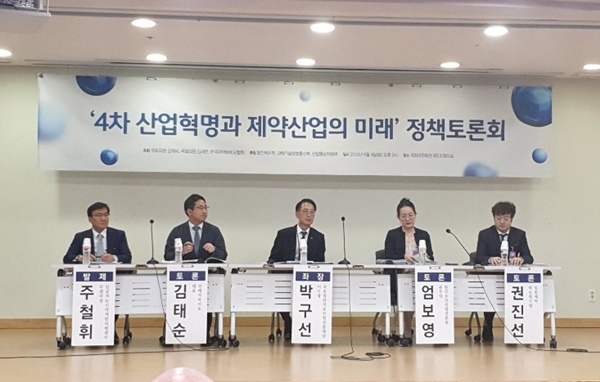The Korean pharmaceutical industry called for the government to ease regulations to spur investment in artificial intelligence-based new drug development and lead the 300 billion won ($254.4 million) global market.
Korea Pharmaceutical and Bio-Pharma Manufacturers Association (KPBMA) held a debate on “The Fourth Industrial Revolution and the Pharmaceutical Industry’s Future” at the National Assembly on Tuesday. Panelists discussed how Korea, as a latecomer in AI-based drug development, should prepare systems and support measures.

The world’s market for using AI to develop innovative medicines is worth 340 billion won as of 2019, said Joo Chul-hwee, director general of KPBMA’s Center for AI-based New Drug Development, who started the debate with a presentation.
The market growth accelerated, particularly after multinational pharmaceutical companies chose machine learning as a breakthrough for new drug development, which generally requires astronomical costs and longtime development with a high chance of failure.
As of May 2019, 132 startups are working on developing new medicines based on AI around the world. Industry watchers expected the first AI-based new drug to be announced by late 2020.
Korea is lagging in the AI-based new drug market. The U.S. witnessed about 2.3 trillion won investment in AI-based startup pharmaceuticals last year, and the Chinese government is taking the lead to support the growth of the sector.
Joo noted that Korea has only 10 years left to catch up with pharmaceutical superpowers such as the U.S. “In the next decade, the nation needs concentrated investment,” he said.
To shorten the gap in a short time, Korea should choose to develop prospective technologies such as deep learning for rare diseases, actively participate in an open network, and strategically select suitable fields, he added. Joo emphasized that Seoul should relax regulations so that the nation can lead the market.
“The U.S. Food and Drug Administration approves AI-based new treatments for rare diseases swiftly, thereby leading this market,” he said.
Panelists agreed with Joo’s argument.
Syntekabio CEO Tyson Kim called such deregulation a “scientifically legitimate regulation,” explaining that businesses can make investment decisions based on how regulations are set.
“What I learned from my experience at a multinational drugmaker was not easing regulations but making regulations scientifically legitimate. Corporate investment will depend on how regulations are set, not on just getting rid of them,” he said.
Another panelist pointed out that the pharmaceutical industry is facing limitations in utilizing big data, which is the key source in AI technologies.
Kim Yang-seok, vice president of Daewoong Pharmaceutical, said, “AI’s accuracy goes up with better and more data. However, we can access some of the public data only in reality.”
Kwon Jin-seon, a principal researcher at Ildong Pharmaceutical, demanded the government provide a detailed plan of the recently announced biohealth support policy.
“The pharmaceutical industry is still skeptical about applying AI to new drug development,” he said.

